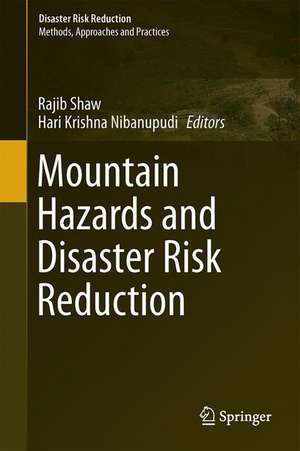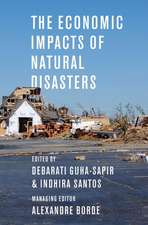Mountain Hazards and Disaster Risk Reduction: Disaster Risk Reduction
Editat de Hari Krishna Nibanupudi, Rajib Shawen Limba Engleză Hardback – 11 dec 2014
| Toate formatele și edițiile | Preț | Express |
|---|---|---|
| Paperback (1) | 560.79 lei 38-44 zile | |
| Springer – 23 aug 2016 | 560.79 lei 38-44 zile | |
| Hardback (1) | 646.75 lei 6-8 săpt. | |
| Springer – 11 dec 2014 | 646.75 lei 6-8 săpt. |
Din seria Disaster Risk Reduction
- 18%
 Preț: 796.61 lei
Preț: 796.61 lei -
 Preț: 394.30 lei
Preț: 394.30 lei - 18%
 Preț: 790.46 lei
Preț: 790.46 lei - 15%
 Preț: 654.12 lei
Preț: 654.12 lei - 18%
 Preț: 967.08 lei
Preț: 967.08 lei - 24%
 Preț: 640.27 lei
Preț: 640.27 lei - 18%
 Preț: 1009.16 lei
Preț: 1009.16 lei - 18%
 Preț: 890.54 lei
Preț: 890.54 lei - 18%
 Preț: 942.94 lei
Preț: 942.94 lei - 15%
 Preț: 646.30 lei
Preț: 646.30 lei - 18%
 Preț: 782.24 lei
Preț: 782.24 lei - 18%
 Preț: 898.75 lei
Preț: 898.75 lei - 18%
 Preț: 956.33 lei
Preț: 956.33 lei - 18%
 Preț: 947.50 lei
Preț: 947.50 lei - 15%
 Preț: 643.34 lei
Preț: 643.34 lei - 24%
 Preț: 921.07 lei
Preț: 921.07 lei - 18%
 Preț: 951.91 lei
Preț: 951.91 lei - 18%
 Preț: 894.97 lei
Preț: 894.97 lei - 15%
 Preț: 641.85 lei
Preț: 641.85 lei - 24%
 Preț: 639.86 lei
Preț: 639.86 lei - 18%
 Preț: 790.14 lei
Preț: 790.14 lei - 18%
 Preț: 729.18 lei
Preț: 729.18 lei - 18%
 Preț: 784.13 lei
Preț: 784.13 lei - 18%
 Preț: 783.50 lei
Preț: 783.50 lei - 18%
 Preț: 784.48 lei
Preț: 784.48 lei - 24%
 Preț: 698.99 lei
Preț: 698.99 lei - 15%
 Preț: 642.18 lei
Preț: 642.18 lei - 15%
 Preț: 651.51 lei
Preț: 651.51 lei - 18%
 Preț: 943.57 lei
Preț: 943.57 lei - 15%
 Preț: 649.54 lei
Preț: 649.54 lei - 24%
 Preț: 690.45 lei
Preț: 690.45 lei - 24%
 Preț: 899.52 lei
Preț: 899.52 lei - 18%
 Preț: 962.27 lei
Preț: 962.27 lei - 15%
 Preț: 652.17 lei
Preț: 652.17 lei - 20%
 Preț: 587.28 lei
Preț: 587.28 lei - 15%
 Preț: 647.40 lei
Preț: 647.40 lei - 18%
 Preț: 957.75 lei
Preț: 957.75 lei
Preț: 646.75 lei
Preț vechi: 760.88 lei
-15% Nou
Puncte Express: 970
Preț estimativ în valută:
123.75€ • 129.56$ • 102.40£
123.75€ • 129.56$ • 102.40£
Carte tipărită la comandă
Livrare economică 05-19 aprilie
Preluare comenzi: 021 569.72.76
Specificații
ISBN-13: 9784431552413
ISBN-10: 4431552413
Pagini: 250
Ilustrații: XI, 284 p. 91 illus., 70 illus. in color.
Dimensiuni: 155 x 235 x 17 mm
Greutate: 0.59 kg
Ediția:2015
Editura: Springer
Colecția Springer
Seria Disaster Risk Reduction
Locul publicării:Tokyo, Japan
ISBN-10: 4431552413
Pagini: 250
Ilustrații: XI, 284 p. 91 illus., 70 illus. in color.
Dimensiuni: 155 x 235 x 17 mm
Greutate: 0.59 kg
Ediția:2015
Editura: Springer
Colecția Springer
Seria Disaster Risk Reduction
Locul publicării:Tokyo, Japan
Public țintă
ResearchCuprins
Overview of Mountain Hazards Issues.- Massive Varunavat Hill Landslide overlooking Uttarkashi Town in Uttarakhand Himalaya – Its treatment vis-à-vis stability analysis.- Floods in the Hindu Kush Region: Causes and Socio-economic Aspects.- Evolution of Geomorphologic Hazards in Hindu Kush Himalaya.- Seismic Hazard in the Himalayan Intermontane Basins: An Example From Kathmandu Valley, Nepal.- Demographic changes, economic changes and livelihood challenges in HKH region.- Land use and land cover change analysis in Uttarakhand Himalaya and its impact on environmental risks.- Mitigating Climatic and Human Induced Disaster risks through Ecosystem Resilience: Harmonizing Built and Natural Environments in the HKH region.- Analysis of policies and institutional framework of HKH countries.- Indigenous resilience and adaptation in high altitude arid zone communities.- Snow water Harvesting in the Cold Desert in Ladakh: An introduction to Artificial Glacier.- Some Socio-economically Significant Landslides in Uttarakhand Himalaya – Events, Consequences and Lessons Learnt.- Gender and Disaster Resilience in the Hindu Kush Himalayan Region.- Interlacing regional water policies, institutions and agreements with livelihoods and vulnerabilities in the HKH region: A case study of Kosi river basin.- Analysis of regional cooperation from the perspective regional and global geo-political developments and future scenarios.
Notă biografică
Hari Krishna Nibanupudi
Hari Krishna Nibanupudi has over 18 years of experience in disaster diplomacy, governance, leadership development & institutional building. He is certified Trainer on water diplomacy from Tufts University and is a recipient of Mary Fran Myers (MFM) award (2013) for contributions to disaster risk reduction. He currently serves at International Center for Integrated Mountain Development (ICIMOD) as a Senior DRR Specialist. Earlier, he worked with World Bank Institute, Oxfam, IIMA & IRMA. He has commissioned and coordinated over 30 humanitarian research projects and published over a dozen of disaster risk reduction tool kits, handbooks, training manuals and videos. Many of these research studies were aimed at providing real time research and evaluation support to on going programs in South Asian countries.
Rajib Shaw
Rajib Shaw is an Associate Professor in the Graduate School of Global Environmental Studies of Kyoto University, Japan. He worked closely with the local communities, NGOs, governments and international organization, including United Nations, especially in the Asian countries. He is currently the Chair of the United Nations Asia Regional Task Force for Urban Risk Reduction, and the President of Asian University Network of Environment and Disaster Management (AUEDM). His research interests are: community based disaster risk management, climate change adaptation, urban risk management, and disaster and environmental education. He has published several books in the field of disaster and environmental management. He is also the Chief Editor of Asian Journal of Environment and Disaster Management.
Hari Krishna Nibanupudi has over 18 years of experience in disaster diplomacy, governance, leadership development & institutional building. He is certified Trainer on water diplomacy from Tufts University and is a recipient of Mary Fran Myers (MFM) award (2013) for contributions to disaster risk reduction. He currently serves at International Center for Integrated Mountain Development (ICIMOD) as a Senior DRR Specialist. Earlier, he worked with World Bank Institute, Oxfam, IIMA & IRMA. He has commissioned and coordinated over 30 humanitarian research projects and published over a dozen of disaster risk reduction tool kits, handbooks, training manuals and videos. Many of these research studies were aimed at providing real time research and evaluation support to on going programs in South Asian countries.
Rajib Shaw
Rajib Shaw is an Associate Professor in the Graduate School of Global Environmental Studies of Kyoto University, Japan. He worked closely with the local communities, NGOs, governments and international organization, including United Nations, especially in the Asian countries. He is currently the Chair of the United Nations Asia Regional Task Force for Urban Risk Reduction, and the President of Asian University Network of Environment and Disaster Management (AUEDM). His research interests are: community based disaster risk management, climate change adaptation, urban risk management, and disaster and environmental education. He has published several books in the field of disaster and environmental management. He is also the Chief Editor of Asian Journal of Environment and Disaster Management.
Textul de pe ultima copertă
The Hindu Kush Himalayan (HKH) region is highly vulnerable to earthquakes and water-induced disasters. This fragile mountain region is under tremendous stress from climate change and land-use degradation that has accelerated flash floods, river-line floods, erosion, and wet mass movements during the monsoon period and drought in the non-monsoon period. Against the backdrop of intensifying disasters and in the absence of a focused documentation of disaster risk reduction issues in the HKH region, this volume presents a comprehensive body of knowledge. The main purpose and objective of this publication is to connect existing data, research, conceptual work, and practical cases on risk, resilience, and risk reduction from the HKH region under a common analytical umbrella. The result is a contribution to advancing disaster resilience and risk reduction in the HKH region. The book will be of special interest to policy makers, donors, and researchers concerned with the disaster issues in the region.
Caracteristici
Presents a one-stop body of knowledge covering a wide range do DRR issues from mountain perspective First comprehensive DRR publication covering HK region Subject is of the interest of policy makers, hundreds of institutions, thousands of researchers and vast population from 08 countries in the HKH region





